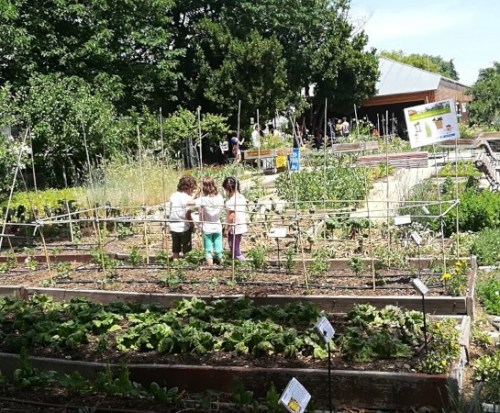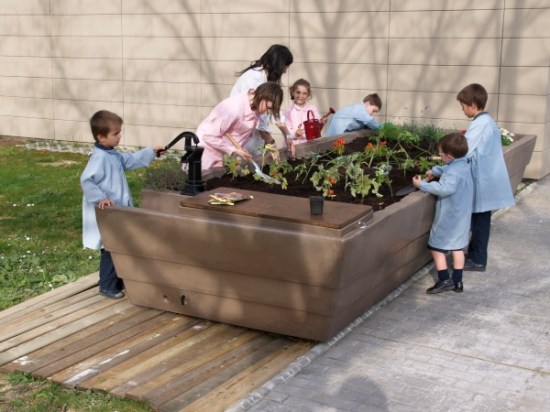School gardens: Objectives and Benefits of the school garden【Ecological projects】

In today’s post we will talk about educational gardens, mainly about what a school garden is, what its objectives are and what the benefits of school gardens should be.

The first two Millennium Development Goals are to eradicate poverty and hunger and to achieve universal primary education. To achieve this, the adequate development of children and of those who will be their livelihoods is essential, which includes giving them adequate education and nutrition. School gardens are a good way to achieve this and have important benefits for the health and cognitive development of children.
Below we will see more details about the objectives of projects with school gardens and the benefits of having gardens in schools.
☝ What is a school garden and what is its importance according to the FAO
The FAO maintains that school gardens are a very useful learning platform to improve education and child nutrition and, at the same time, promote the conservation of the environment and the social, physical and mental well-being of the entire educational community.
While in industrialized countries intensive agriculture and current eating habits have increasingly harmful effects on our health and the environment, in many underdeveloped countries they do not have the means and sufficient training to achieve an agriculture capable of feeding all people sufficiently and safely.
Together we can ensure that school gardens play a significant role in the fight against these problems that threaten society today: food insecurity and climate change.
For this, it is necessary to promote habits that improve health, such as a healthier diet, and good nutritional, agricultural and environmental education that makes children aware of the need to change things, since future actions and measures depend on them. eradicate these problems.School gardens must be geared towards responding to these problems and needs.
✅ Objectives of school gardens
According to the FAO and other national and international organizations, the objectives of a school garden should be the following:
- Improve the quality of education through a more dynamic pedagogy that includes multidisciplinary study plans that combine theoretical and practical knowledge and livelihood techniques.
- Strengthen practical skills in agriculture and horticulture through the creation and maintenance of family gardens.
- Provide active teaching linking horticulture to play and recreation, as well as to other subjects such as mathematics, biology, reading and writing.
- Provide practical teachings on nutrition that promote the production and consumption of healthy foods and a healthy lifestyle.
- Increase access to education by attracting families to schools that address issues that affect their daily lives.
- Increase the nutritional quality of the food that children eat and reduce the number of malnourished or inadequately fed children.
- Improve children’s attitude and knowledge about agriculture and rural life.
- Educate in environmental sensitivity contributing to the sustainability of the planet through the inclusion of environmental and ecological training (See article on the importance of Ecological Agriculture).
- Offer students a tool for survival or support for the family economy in times of food shortages or economic difficulties.
- Especially in underdeveloped countries, increase school attendance and, in many homes, compensate for the absence of parents in terms of the transfer of knowledge necessary for the vital development of children and young people.
- Promote income-generating opportunities.
- In cities, improve the urban environment and sustainability.

✅ Benefits of a school garden
Many of them are related to the objectives that are intended to be achieved, but many others are added benefits that arise as a result of the development of agricultural activity in schools.
- They are beneficial for learning: «I hear and I forget, I see and I remember, I do and I understand» (Confucius, 551-479 BC).
- They promote the knowledge of varieties of fruits and vegetables that were unknown to the children and/or their families.
- They provide a place to gain knowledge related to nature, agriculture and nutrition.
- They improve the diet and are a source of healthy, natural and varied food, important for the physical and mental development of children.
- They help fight against problems related to child nutrition: obesity, malnutrition…
- They represent a space for enjoyment and recreation within the school.
- They promote entrepreneurial skills.
- They improve the environment and the sustainability of cities.
- They contribute to the regeneration and conservation of the environment and its resources.
- They favor socioeconomic development.
- They are an important social tool since the teamwork of the boys and girls of the class groups takes place in them, as well as their interaction with teachers and families, developing ethical values of coexistence, participation and collaboration.
- Increases relationships between human beings and nature.
- They reinforce knowledge of basic subjects such as reading, writing, biology or mathematics.
- They improve the intelligence of children.
These are just some of the benefits of school gardens for the lives of children and the rest of the educational community; If you know others, do not hesitate to leave your contribution in the comment thread of the post.

To find out more about educational gardens, in the category «Types of gardens around the world» you can find more information and examples of school gardens, such as the School Garden in China or the article on Types of school projects with gardens. Little by little we will be making known more real experiences of orchards in schools and other educational centers. We encourage you to send us photos or tell us about your experience if you know or are participating in a school garden.
References
- FAO, 2006. Create and manage a school garden. A handbook for teachers, parents and communities.
- Blair, D., 2009. The child in the garden: an evaluative review of the benefits of school gardening.
- FAO, 2010. New School Garden Policy. ISBN 978-92-5-106615-5.
- Rodríguez MArín, F. et al., 2015. The ecological school garden as a tool for education in and for fair degrowth. Research at the School, nº 86, pag. 35-48.



![Photo of Quince Tree: [Care, Planting, Irrigation, Substrate and Pests]](https://www.complete-gardening.com/wp-content/uploads/2022/08/quince-tree-care-planting-irrigation-substrate-and-pests-390x220.jpg)
